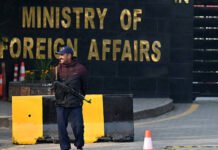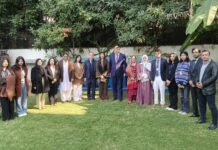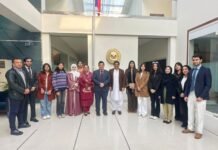Washington DC, 6 July 2022 (TDI): On Tuesday, the State Department selected Nuclear Weapons and Sanctions Expert, Richard Nephew as its new Global Anti-corruption Officer.
The announcement, made by Secretary of State Antony Blinken to commemorate World Anti-Corruption Day, aims to “elevate the fight against corruption across all sectors of US diplomacy and international assistance.”
Creating and filling this post shows the importance of anti-corruption as a vital national security objective for the United States, as well as the critical role those global partnerships play in this battle.
Today, @SecBlinken named Richard Nephew as Coordinator on Global Anti-Corruption. This position will integrate and elevate the fight against corruption across all aspects of U.S. diplomacy and foreign assistance. https://t.co/Iq5iCEZTnh
— Department of State (@StateDept) July 5, 2022
Richard takes expertise both inside and outside the government to the post of Global Anti-Corruption Coordinator. He is returning to the Department after serving as a Senior Research Scholar at Columbia University’s Center on Global Energy Policy.
Before joining Columbia, Richard worked as a Deputy Special Envoy for Iran, the State Department’s Principal Deputy Coordinator for Sanctions Policy, and the National Security Staff’s Director for Iran.
Blinken welcomed Richard back to the Department in this critical position. He believes that his experience and enthusiasm for fighting corruption and promoting transparency would be helpful to their global efforts.
Richard and his team will work closely with foreign partners to improve US anti-corruption policy. His responsibilities include leading the State Department’s implementation of the first-ever United States Strategy to Combat Corruption.
Efforts are being advanced through the Summit for Democracy, as the US government devotes all its resources to advancing the Administration’s anti-corruption and broader democratic revitalization agenda.
Richard Nephew will serve as our Coordinator on Global Anti-Corruption. Richard’s experience and dedication will be an asset to our efforts worldwide to address transnational corruption and kleptocracy, key components of the @WhiteHouse Strategy on Countering Corruption.
— Secretary Antony Blinken (@SecBlinken) July 5, 2022
US Approach Towards Corruption
To effectively combat contemporary corruption, the US government recognizes the international elements of the problem and responds in a way that is both systemic and adapted to local realities.
The United States will continue to examine and take actions as needed to better protect the financial system and will do so in collaboration with like-minded allies and relevant multilateral institutions.
They will use criminal and civil enforcement actions to enforce the Foreign Corrupt Practices Act (FCPA) and other statutory and regulatory regimes.
The United States will enhance its assistance for state and non-state reform partners, strengthen other governments’ capacity to combat corruption, and empower those on the front lines of exposing corrupt activities, such as activists, investigative journalists, and law enforcement.








